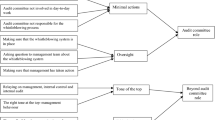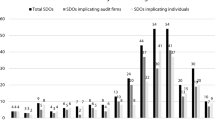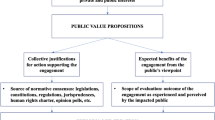Abstract
Accounting literature has commonly judged the impact of regulation on auditors’ ethical commitment by studying daily audit practice. We argue that the content of the regulations themselves is an important determinant of such an impact. This paper evaluates the capacity of the content of regulation to promote audit ethics by reference to the European Union’s (EU) audit policy. Anchored in the extant conceptual perspectives on ethics, our analysis of relevant policy documents shows that the EU’s approach to audit ethics relates most strongly to the deontological perspectives on ethics and leaves largely unexplored other means of promoting auditors’ ethical stance, such as by stimulating virtue ethics. We find that it is the EU regulators’ restricted view of the conceptual foundations of audit ethics that limits the capacity of their policy to effectively stimulate auditors’ ethical commitment. The paper also discusses the potential implications of our analysis for the design of future audit policy.
Similar content being viewed by others
Notes
One example is the multi-billion negligence claim by the British insurer Equitable Life against Ernst and Young in 2008.
The collapse of the US energy giant Enron and the subsequent bankruptcy in 2002 of Arthur Andersen, the company’s auditor accused of a major breach of professional ethics, led to arguably the greatest turmoil in the history of the audit profession. Such was the impact of the Enron scandal on the profession’s reputation that already the following year the European Commission announced its plans (European Commission 2003) to introduce measures to tackle the problem of low perceived standard of audit quality and ethics, which eventually led to the issuance of the significantly revised Eighth Company Law Directive.
Some latest revisions, for example, concern changes addressing conflicts of interest faced by professional accounts as well as a breach of the Code’s requirements. See the 2013 Handbook of the Code of Ethics (IFAC 2013).
Professional negligence can be defined as an ‘act or omission which occurs because the person concerned [auditor] has failed to exercise the degree of professional care and skill, appropriate to the circumstances of the case’ (ACCA 2009, p. 1).
The system means that an auditor can be required to pay the entire amount of damages irrespective of whether the damages were caused by the unprofessional audits or by the wrong-doing of other parties, such as the company’s management.
Proportionate liability means an auditor can be asked to compensate for the damages caused which is in proportion to the degree of his/her culpability.
References
ACCA. (2009). Professional liability of accountants and auditors. London: Association of Chartered Certified Accountants.
Armstrong, M. B., Ketz, E., & Owsen, D. (2003). Ethics education in accounting: Moving toward ethical motivation and ethical behaviour. Journal of Accounting Education, 21(1), 1–16.
Bantleon, U., Bassen, A., d’Arcy, A., Hucke, A., Kohler, A., & Pedell, B. (2011). Implementation of Article 41 of the 8th EU Directive in the EU member states—Impact on internal governance mechanisms. International Journal of Corporate Governance, 2(2), 140–155.
Beauchamp, T. L., & Bowie, N. E. (1997). Ethical theory and business (5th ed.). New Jersey: Prentice Hall International.
Benston, G. J., & Hartgraves, A. L. (2002). Enron: What happened and what we can learn from it. Journal of Accounting and Public Policy, 21(2), 105–127.
Blough, C. G. (1960). Accounting and auditing problems. Journal of Accountancy. 5.
Brady, N., & Dunn, C. (1995). Business meta-ethics: An analysis of two theories. Business Ethics Quarterly, 5(3), 385–398.
Campbell, T. (2005). Introduction: The ethics of auditing. In T. Campbell & K. Houghton (Eds.), Ethics and auditing (pp. xxi–xxxii). Canberra: The Australian National University E Press.
Carter, C., & Spence, C. (2014). Being a successful professional: An exploration of who makes partner in the Big Four. Contemporary Accounting Research,. doi:10.1111/1911-3846.12059.
Cheffers, M., & Pakaluk, M. (2007). Understanding accounting ethics. Sutton: Allen David Press.
Chung, J., Farrar, J., Puri, P., & Thorne, L. (2010). Auditor liability to third parties after Sarbanes-Oxley: An international comparison of regulatory and legal reforms. Journal of International Accounting, Auditing and Taxation, 19, 66–78.
Clements, C., Neil, J. D., & Stovall, O. S. (2009). An analysis of International Accounting Codes of Conduct. Journal of Business Ethics, 87(1), 173–183.
Commission, European. (2011). Reform of the audit market. Brussels: European Commission.
Commission, European. (2014a). Directive 2014/56/EU ameding directive 2006/43/EC on statutoy audits of annual accounts and consolidated accounts. Brussels: European Commission.
Commission, European. (2014b). Directive 2006/43/EC on statutory audits of annual accounts and consolidated accounts. Brussels: European Commission.
Cousins, J., Mitchell, A., & Sikka, P. (1999). Auditor Liability: the other side of the debate. Critical perspectives of Accounting, 10, 283–312.
Crane, A., & Matten, D. (2010). Business ethics: Managing corporate citizenship and sustainability in the age of globalization (3rd ed.). Oxford: Oxford University Press.
Dewing, I. P., & Russell, P. O. (2004). Accounting, auditing and corporate governance of European listed companies: EU policy developments befre and after Enron. Journal of Common Market Studies, 42(2), 289–319.
Dobson, J. (1997). Finance ethics the rationality of virtue. Lanham, MD: Rowman and Littlefield Publishers.
European Commission. (2003). Reinforcing the statutory audit in the EU. Brussels: European Commission.
European Commission. (2008). ‘Commission Recommendation of 5/VI/2008 Concerning the Limitation of the Civil Liability of Statutory Auditors and Audit Firms, 2008/473/EC. Brussels: European Commission.
European Commission. (2010). Audit policy: Lessons from the crisis. Brussels: European Commission.
Gendron, Y., & Spira, L. (2009). ‘What went wrong? The downfall of Arthur Andersen and the construction of controllability boundaries surrounding financial auditing. Contemporary Accounting Research, 26, 987–1027.
Hartman, E. H. (1998). The role of character in business ethics. Business Ethics Quarterly, 8(3), 547–559.
Hooker, J. (2007). Professional ethics: Does it matter which hat we wear? Journal of Business Ethics Education, 4, 103–112.
Howieson, B. (2005). Can we teach auditors and accountants to be more ethically competent and publicly accountable? In T. Campbell & K. Houghton (Eds.), Ethics and Auditing (pp. 265–288). Canberra: The Australian National University E Press.
Humphrey, C., Kausar, A., Loft, A., & Woods, M. (2011). Regulating audit beyond the crisis: A critical discussion of the EU green paper. European Accounting Review, 20(3), 431–457.
Humphrey, C., & Samsonova, A. (2013). A crisis of identity? Juxtaposing auditor liability and the value of audit. In R. Di Pietra, S. McLeay, & J. Ronen (Eds.), Accounting and regulation. New York: Springer Science.
Humphrey, C., Samsonova, A., & Siddiqui, J. (2013). Auditing, regulation and the persistence of the expectation gap. In C. Mourik & P. Walton (Eds.), The Routledge companion to accounting, reporting and regulation. Abingdon: Routledge.
ICAEW. (2011). Code of ethics. London: Institute of Chartered Accountants in England and Wales.
ICAEW. (2012). Acting in the public interest: A framework for analysis. London: Institute of Chartered Accountants of England and Wales.
IFAC. (2006). Code of ethics for professional accountants. Geneva: International Federation of Accountants.
IFAC. (2012a). IFAC opens debate on public interest: Issues Policy Position Paper 5, A definition of the public interest. Press Release July 29, 2012. Geneva: International Federation of Accountants.
IFAC. (2012b). A definition of the public interest’, IFAC Policy Position Paper 5. Geneva: International Federation of Accountants.
IFAC. (2013). Handbook of the code of ethics for professional accountants. Geneva: International Federation of Accountants.
Jeppesen, K. K., & Loft, A. (2011). Regulating audit in Europe: The case of the implementation of the EU Eight Directive in Denmark 1984–2006. European Accounting Review, 20(2), 321–354.
Kinney, W. J. (2005). Twenty-Five years of audit deregulation and re-regulation: What does it mean for 2005 and beyond? Auditing: A Journal of Practice and Theory, 24(1), 89–109.
Koehn, D. (1995). A role for virtue ethics in the analysis of business practices. Business Ethics Quarterly, 5(3), 533–539.
Larry, A., & Moore, M. (2008). Deontological ethics. In E. N. Zalta, U. Nodelman, C. Allen, & J. Perry (Eds.), The Stanford encyclopaedia of philosophy. Stanford: Stanford University Press.
Libby, T., & Thorne, L. (2004). The identification and categorization of auditors’ virtue. Business Ethics Quarterly, 14(3), 479–498.
Libby, T., & Thorne, L. (2007). The development of a measure of auditors’ virtue. Journal of Business Ethics, 71, 89–99.
MacIntyre, A. (1984). After virtue (2nd ed.). Notre Dame: University of Notre Dame Press.
Mautz, R. K., & Sharif, H. A. (1961). The philosophy of auditing. Sarasota: American Accounting Association.
McMillan, K. P. (2004). Trust and the virtues: a solution to the accounting scandals? Critical Perspectives on Accounting, 15, 943–953.
McPhail, K. (2004). An emotional response to the state of accounting education: Developing accounting students’ emotional intelligence. Critical Perspectives on Accounting, 15(4–5), 629–648.
McPhail, K., & Walters, D. (2009). Accounting and business ethics: An introduction. London: Routledge.
Melé, D. (2005). Ethical education in accounting: Integrating rules, values and virtues. Journal of Business Ethics, 57, 97–109.
Micewski, E. R., & Troy, C. (2007). Business ethics: Deontologically revisited. Journal of Business Ethics, 72, 17–25.
Mintz, S. A. (2006). Accounting ethics education: Integrating reflective learning and virtue ethics. Journal of Accounting Education, 24(2–3), 97–117.
Mintz, S. A. (2010). Linking virtue to representational faithfulness in making judgements in a principles-based environment. Research on Professional Responsibility and Ethics in Accounting, 14, 113–136.
Mueller, F., Carter, C., & Ross-Smith, A. (2011). Making sense of career in a Big Four accounting firm. Current Sociology, 59(4), 551–567.
Neil, J. D., Stovall, O. S., & Jinkerson, D. L. (2005). A critical analysis of the accounting industry’s voluntary code of conduct. Journal of Business Ethics, 59(1–2), 101–108.
Orren, G. (1997). The appearance Standard on Audit Independence: What We Know and What We Should know? A Report Prepared on Behalf of the AICPA in Connection with the presentation to the Independence Standard Board.
Patterson, D. M. (2001). Causal effects of regulatory, organizational and personal factors on ethical sensitivity. Journal of Business Ethics, 30(2), 123–159.
Pincoff, E. (1986). Quandaries and Virtues. Lawrence, KS: University Press of Kansas.
Plummer, K. (2005). Improving ethical judgement through deep learning. In T. Campbell & K. Houghton (Eds.), Ethics and Auditing (pp. 239–263). Canberra: The Australian National University E Press.
Preuss, L. (1998). On ethical theory in auditing. Managerial Auditing Journal, 13(9), 500–508.
Quick, R. (2012). EC Green Paper proposals and audit quality. Accounting in Europe, 9(1), 17–38.
Quick, R., Turley, S., & Willekens, M. (2008). Auditing, trust and governance: Developing regulation in Europe. New York: Routledge.
Samsonova-Taddei, A., & Humphrey, C. (2015). Risk and the construction of a European audit policy agenda: the case of auditor liability. Accounting, Organizations and Society, 41, 55–72.
Shapiro, B., & Matson, D. (2008). Strategies of resistance to internal control regulation. Accounting, Organizations and Society, 33(2/3), 199–228.
Sikka, P. (2009). Financial crisis and the silence of the auditors. Accounting, Organizations and Society, 34(6–7), 868–873.
Smith, A. (1776) The wealth of nations. USA: Renascence Editions-The University of Oregon. http://www.unilibrary.com/ebooks/Smith,%20Adam%20-%20The%20Wealth%20of%20Nations.pdf
Solomon, R. C. (1992). Corporate roles, personal virtues: An Aristotelian approach to business ethics. Business Ethics Quarterly, 2, 317–339.
Solomons, D. (1991). Accounting and social change: A neutralist view. Accounting Organizations and Society, 16(3), 287–295.
Thorne, L., Massey, D. W., & Magnan, M. (2003). Institutional context and auditors’ moral reasoning: A Canada–U.S. comparison. Journal of Business Ethics, 43(4), 305–321.
Tinker, T. (1991). The accountant as partisan. Accounting, Organizations and Society, 16(3), 297–310.
Vinten, G. (1994). Whistleblowing: subversion or corporate citizenship? London: Paul Chapman Publishing.
Williams, P. (2010). The focus of professional ethics: Ethical professionals or ethical profession? Research on Professional Responsibility and Ethics in Accounting, 14, 15–35.
Author information
Authors and Affiliations
Corresponding author
Rights and permissions
About this article
Cite this article
Samsonova-Taddei, A., Siddiqui, J. Regulation and the Promotion of Audit Ethics: Analysis of the Content of the EU’s Policy. J Bus Ethics 139, 183–195 (2016). https://doi.org/10.1007/s10551-015-2629-x
Received:
Accepted:
Published:
Issue Date:
DOI: https://doi.org/10.1007/s10551-015-2629-x




